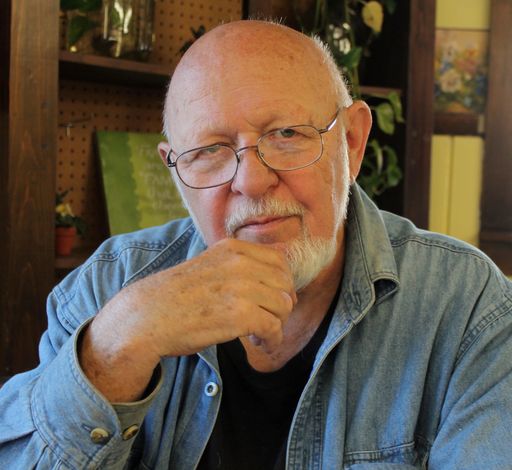

Ted Cornell
April 2, 1944 — March 30, 2025
Ted Cornell, Off-Broadway Theater Director Turned Adirondack Civic Leader & Artist, Dies at 80.
He brought skills and sensibilities honed at New York City's Public Theater to the Adirondacks, transforming small town life, and brought Method Acting to Art
Ted Cornell, an early associate of Joseph Papp at the New York Shakespeare Festival, died on March 30th, 2025 at Elderwood, in Ticonderoga, New York, following a long illness, three days short of his 81st birthday.
He was born Edward Hawthorne Cornell in Hartford, Connecticut on April 2, 1944, to Valentina Kudryvets and Sidney Cornell. His father, an MIT-trained engineer, was part of the instrumentation lab at MIT under Charles Draper where the inertial guidance systems for the first intercontinental ballistic missiles were invented. His mother, much beloved both for her cooking and hospitality, came to the US from Russia as a baby and worked as a secretary. Cornell spent his childhood in Woods Hole on Cape Cod and in the suburbs of Boston.
Cornell attended Williams College and apprenticed at the Williamstown Theatre Festival under director Nikos Psacharopoulos. He traveled in 1963 with students from Massachusetts to Washington, DC attending the March on Washington where Martin Luther King, Jr. spoke; this had a lasting impact on his worldview. He graduated in 1965 with a B.A. in Philosophy. Following graduation in the summer of 1965, he ran the Montserrat Summer Festival Theatre with a friend; the theater was later destroyed by the Soufrière Hills volcano.
Cornell attended Yale Drama School for Directing, studying acting with Stella Adler; he became a Method director. He was an empath who could read the people in the room-a strength in a director but also burden. Joe Papp hired him out of Yale Drama School to work on The Naked Hamlet (1968) starring Martin Sheen. Cornell had written the first draft of the script-a radical revision of the Shakespeare play-as a class assignment at Yale.
Cornell was the first managing director of the New York Shakespeare Festival's Other Stage. He directed No Place to Be Somebody (1969) at the Public Theater, the first play from the New York Shakespeare Festival to win a Pulitzer Prize for drama, and the first off-Broadway play to receive the honor. The playwright, Charles Gordone, was the first African American playwright to receive a Pulitzer. After the success of No Place to Be Somebody, in 1972 Cornell returned to Yale as a graduate student to study philosophy.
As a director, Cornell worked with Al Pacino and Johnny Cazale to develop a New York Shakespeare Festival production of The Resistible Rise of Arturo Ui, an allegory on the rise of the Nazi Party, by Bertolt Brecht. Originally scheduled for ten performances in July of the 1974-75 season at The Other Stage, the Shakespeare Festival production never ran, in part due to illness of several key cast members. The production design was to emphasize lighting in a minimalist set. Pacino later took the production to Boston which then ran with another director. Rehearsals were during the same period as the filming of Dog Day Afternoon. Via his connection with Pacino and Cazale, Cornell had a bit part in it, playing the detective in the white jacket who nervously points a gun at Pacino playing bank robber Sonny Wortzik.
Cornell won an Obie Award in 1980 in directing for Charles MacArthur's political satire, Johnny on a Spot performed at the Brooklyn Academy of Music. Between 1967 and 1991, Cornell directed more than seventy productions for venues including The New York Shakespeare Festival, The Long Wharf Theatre, Arena Stage, The Hartford Stage Company, The Indiana Repertory Theatre, Playwrights' Horizons, The Actors Studio, and The Brooklyn Academy of Music. Cornell was co-coordinator of the Playwrights and Directors Unit of The Actors Studio from 1978 to 1979. He was later a Visiting Professor and acting instructor at Ohio University, Hofstra University, and New York University.
Cornell developed a view of politics that beneficial change must be built from the bottom up; this was his aesthetic of civic life. In this vein, Cornell led the Franklin House Tenants, a tenants' group which in 1975 organized a rent strike and gained control of a landmark hotel under the Brooklyn Bridge on the Brooklyn waterfront. He lived there until he moved out of New York City in the 1990s. In addition to his theater work, while in living in Brooklyn, Cornell also supported himself by working on the Penn Central Railroad as a freight brakeman, as a cab driver, and at an investment banking firm specializing in bonds for rural hospitals, headquartered at One World Trade Center.
A gregarious introvert, Cornell eventually found the life of the theater to be "corrosive" and so moved to the solitude of a former dairy farm-with an early twentieth century farmhouse, barn, and outbuildings on a 140-acre tract-in Wadhams in New York State's Adirondack Park, to reinvent himself as a painter and, later, a sculptor. Shortly after he bought the property, somewhat to the mystification of his farming neighbors, he arranged for the Army Corp of engineers to do a wetlands restoration project involving Crooked Brook which flowed across the property, reverting tiled farm fields with drainage suitable for dairy farming, to the wetlands than have gone before. This entailed the creation of two artificial ponds, one at the top of the hill and one down below.
Though Cornell had moved to the Adirondacks for the solitude, his tendency to galvanize people into action remained. He served on the Board of Westport, NY's Depot Theater and acted in one of their productions. He was President of the Trustees of the Wadhams Free Library, overseeing a three-year major renovation of the library, and also read stories to children at the library's story hour. As Chairman of the Planning Board for the Town of Essex, he helped write the comprehensive plan and zoning ordinance and was central to the Essex Farm initiative which introduced production-scaled organic farming to the Boquet Valley. He was a founding member of The Diogenes Society, which he described as a "non-partisan advocacy group demanding honesty in public discourse," designing the organization's logo, signs, and props. He was a board member of The Boquet River Association, an environmental advocacy group. He acted in Carrie Treadwell's The American Studio Theater group, doing whimsical summer productions of Shakespeare plays in Westport's Ballard Park. And he led the renovation and revival of the Whallonsburg Grange Hall, developing it from a disused white elephant to a vibrant social and cultural hub. The net effect of these civic engagements has been transformative to the artistic and cultural life of the Adirondacks.
When he relocated to the Adirondacks in 1991, Cornell's intention was to "discover" painting through the techniques of Method Acting. He used his preparation techniques when learning to do abstract painting in oils. And then took that technique to photorealistic landscape painting. He began showing his work via the Atea Ring Gallery in 1996, and had many shows up through 2009. His landscape paintings are exhibited in the Adirondack History Museum in Elizabethtown, NY ("Furious Trees") and in the Essex, NY Town Hall ("Election Day"). Cornell repurposed his barn as a gallery space for a solo show curated by Atea Ring. And when he arranged for his barn studio to be part of a local farm tour, he dubbed his farm to be an Art Farm.
A decade after moving to the Adirondacks, Cornell discovered junk sculpture when the neighbor's silo blew over into a ravine on his property. He reworked the silo into a rotating sculpture mounted on a large wooden spindle entitled, "The Phoenix of Wadhams." He transformed rusting farm equipment on the property into art with a mind towards honoring the dying farm culture that had once flourished in this landscape. The final work in that series is "The Memory Tree," a 20 ft. obelisk-style monument made from a rusted culvert pipe that he had an assistant spend several months adorning with gold leaf. It was installed in 2013 with the help of a local well-driller. Just as he tended to organize the people around him, his sculptures tended to organize the landscapes they inhabit. And he had a talent for recruiting people who owned heavy machinery to assist with his art.
After the Champlain Area Trails opened a public hiking trail across the ridge just beyond Cornell's property line, a plan was hatched for an Art Farm Trail, allowing the public to enjoy his sculptures and then hike up through his woods to link up to the trail system. The Art Farm Trail became one of CAT's most popular trails, in part because the pond at the top of the hill, from the 1995 wetlands restoration project, is extraordinarily rich in bird life. In June of 2024, there was a retrospective show on Cornell's art, life, and work at Whitcomb's Arts in Essex, NY entitled, "This Will Be Fun," including a celebratory hike of the Art Farm Trail.
Toward the end of his life, Cornell's interest in directing rekindled. With Kathryn Cramer, he co-wrote a screenplay based on Cramer's science fiction short story "You, in Emulation," intending to film in the Adirondacks using local actors. While seeking film funding in 2014, Cornell was diagnosed with prostate cancer. He was successfully treated but suffered a major stroke six months later, impairing his movement and cognition. The film was not to be.
The last and final play Cornell directed was a 2017 production of Connor McPherson's "The Birds," based on the Daphne Du Maurier story, at the Essex Theatre Company, in Essex, NY. Cornell played the role of Tierney, a man gone mad in post-apocalyptic rural isolation who trades in canned goods.
Cornell never fully recovered from his stroke. In 2022, he contracted Lyme disease, leading to a downward spiral. He broke his ankle the morning after a hospital discharge, quickly contracting COVID in sub-acute rehab; he was never again to live at his farm. He sold the farm in 2024 with an arrangement allowing sculptures to remain. The Art Farm Trail was Champlain Area Trails' first conversion from a temporary to a permanent trail easement; the trail remains open to the public for hiking.
Ted Cornell is survived by his sons, Ethan and Noah Cornell of Brooklyn, NY, and by his longtime partner Kathryn Cramer of Westport, NY. He is also survived by former spouses Josie Poppy, mother of his sons, of Woodacre, CA and Michelle Frezner Cornell of Columbus, Ohio. An important figure in the lives of Cramer's two children, Peter and Ratio Hartwell, he was also a theater and art mentor to many other Adirondack young people. His Adirondack civic engagement earned him strong support from his community. As he entered frailty, a medical social worker remarked that she had never before seen a patient with such a robust social support system.
The family is grateful to the staff at Elderwood at Ticonderoga for making Cornell feel at home in the final two years of his life. He will be laid to rest in Spirit Sanctuary, a green burial ground in Essex, NY. In lieu of flowers, memorial donations in his name to the Whallonsburg Grange Hall, the Wadhams Library, and Champlain Area Trails are encouraged.
Services were entrusted to Heidrick Funeral Home, PO Box 188, 7521 Court St., Elizabethtown, NY 12932. Condolences may be left at www.heidrickfuneralhome.com.
Guestbook
Visits: 640
This site is protected by reCAPTCHA and the
Google Privacy Policy and Terms of Service apply.
Service map data © OpenStreetMap contributors



